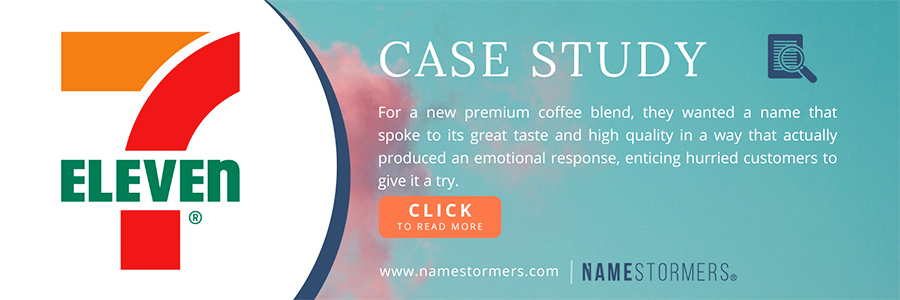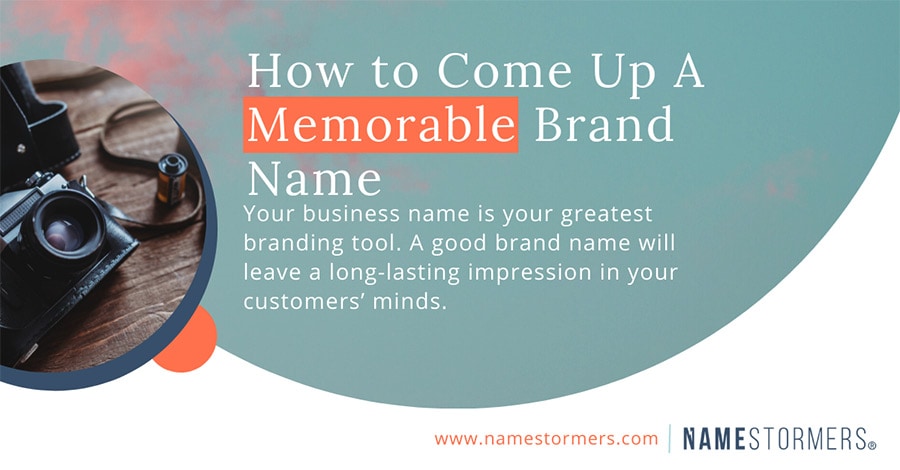There are several processes involved in setting up a business, but none is as simultaneously simple and as difficult as a unique and memorable name for your business. But why?
In theory, the brand naming process seems simple. String a few letters and syllables together, and you’ve got a name, right? You could even use a made-up word instead of real words. So, why is it that something that seems so straightforward can feel so impossible?
It likely comes down to the fact that a lot of your success is riding on your ability to choose a great brand name. Potential customers will hear your brand name before they know what kind of products or services you offer, which means that your company name must reflect your brand essence.
For example, it must give some indication of your brand’s mission, visions, and values so that customers get a sense of what you stand for whenever they hear your brand name.
Your brand name must also be unique to avoid your company being confused with other brands, which could otherwise make it nearly impossible to build brand recognition. In short, choosing a powerful brand name is difficult as it needs to leave a lasting impression in your customer’s minds.
That’s a lot of pressure on one or two words. Fortunately, coming up with a good brand name does not have to be as intimidating as it first seems. In fact, with our help, it can become a relatively easy task.
In this article, we’ll look at how to come up with a brand name and reveal some insider secrets that you may not be aware of!
Define Your Objectives

The first step to coming up with a name for your brand is having a clear objective or end goal in mind. This will give you a framework to streamline the brainstorming process, ensuring that you end up with a shortlist of potential names that reflect the most critical aspects of your business.
To begin, think carefully about your brand identity and ask yourself the following questions:
- What message do you want to pass on to your customers?
- What emotions or feelings do you want the name to evoke?
- What impression do you want your name to leave on your customers?
- Where will the name be displayed?
- Who do you want to attract?
- Do you need an exact dot-com domain?
- Will this be a global company, service, or product?
It’s also crucial that you think big from the start. After all, while you may be running a new business, you want your company to grow and spread its wings – meaning you must choose a name that will be flexible enough to allow for more products and services to be offered should you diversify in the future. Simply put, a good brand name should not confine you to a limited number of products/services.
You must also define your geographic scope and be careful with names that could confine you to a specific location. Say you have a beauty brand in Iowa, and name it “Iowa Beauty and Cosmetics.” What will you do when you succeed and want to expand to Wisconsin or Illinois?
Bottom line: Set your objectives, think big picture, and steer clear of names that will compel you to rebrand in the future. While many brands decide to rebrand, it’s not an ideal scenario; it is both complex and time-consuming and could mean losing customers during the transitional period – even if your new brand name is better than your original one.
Know What Features Make a Perfect Business Name
Understanding what features contribute to a perfect brand name is crucial when developing potential name ideas. For example, it’s not only important that it “sounds right,” it should also resonate with your target audience, transcend fads and trends, and help you build brand recognition.
With that in mind, here are some essential features you must consider when working with your founding team to develop a brand name.
Simplicity
Simplicity is one of the core features of a good business name. Your customers have a lot on their minds, and memorizing your brand’s name is probably not a priority.
Typically, the most memorable names are short, simple, and easy to spell and pronounce. When developing a good brand name, consider how your name translates into other languages if you are considering expanding overseas.
Remember that word of mouth is one of the most essential aspects of marketing for both small and established brands. How will customers tell their friends about their favorite new brand if they cannot remember or pronounce your name?
When considering how to spell and pronounce your company name, you should also factor in your customer’s ability to find your business online. Ideally, it should be possible to find your brand without having issues with correct spelling. After all, if someone misspells your name while searching online, you’ll lose them to your competitors. Once again, this lends itself to the idea that when coming up with a solid name for your brand, it’s best to keep it short and sweet.
Memorability
It goes without saying that your business name must also be memorable. After all, the biggest brands, such as Coca-Cola, are able to stay afloat based on the recognition earned through their name alone, which means that, as a company, they no longer have to invest quite as much money into a marketing strategy.
However, memorability isn’t something that’s decided consciously – it’s decided by the subconscious brain.
It’s also important to note that with branding, memorability isn’t synonymous with pleasant or well-liked, and failing to distinguish between the two could make it harder to elicit a positive emotional response from potential customers. Think of the annoying song that gets stuck in your head on a loop – and remember that brand names can be memorable in the same way.
For instance, let’s compare the brand names Google and InfoSeek. Despite InfoSeek being a more pleasant-sounding and telegraphic name for a search engine, Google is easily the more memorable of the two. That’s likely why the former shut down, while Google gets 89.3 billion visits a month.
Google is evocative. The first time you hear it, it leaves you thinking, “What is a Google?” and you’ll probably be thinking about it for a while after hearing it for the first time, whether consciously or subconsciously.
This kind of reaction is how a brand name becomes memorable. Who even remembers that there was once a search engine brand known as InfoSeek?
The only way to know if you’ve chosen a memorable brand name is by testing it. At NameStormers, we’re able to test the memorability of brand and company names on your behalf.
The process involves showing your target consumers a list of potential brand names that you have come up with. Unbeknownst to them, we then perform a follow-up memorability test 1-2 days later. The test asks them to fill in blanks rather than pick from multiple-choice options.
We start with the prompt, “From the names given to you in the last couple of days, which can you remember?”. The unaided awareness ensures that consumers can only list the names they truly remember – which can make it easier for you to choose a good brand name after conducting this research.

Creativity
Of course, having a simple brand name does not mean it should be bland – you still need to get your creative juices flowing when working on your brand identity. After all, a business name that’s too straightforward can make your target audience lose interest in your brand before they sample your products or services.
Furthermore, you do not want to risk blending into the background, giving your competitor’s brand a chance to shine.
As such, you should get creative during the brand naming process and come up with ideas that feature alliteration, rhyming, and wordplay. This will help you to come up with a brand name that’s fun, playful, and, most importantly, memorable.
However, it’s crucial that you refrain from latching onto passing trends when brainstorming brand names. This could mean that your brand will struggle to remain relevant once the trend passes.
Focus on your audience and your competition
When coming up with name ideas, you should think about what you’d like your brand to be known for. Ask yourself the following questions:
- What makes you stand out from your competitors?
- Who’s your target audience and target market?
- What do you want your customers to remember you for?
- What are your brand’s values and aims?
- What are the best brand names around?
- What are the brand names of your competitors?
We say it time and time again – what you personally think about the brand name you create doesn’t matter, but what your target audience thinks is everything.
Do you have clarity on who you’re targeting, both now and in the future?
Do you have specific personas that you keep at the forefront of your mind when making business decisions?
Do you know the age, gender, income level, interests, problems, and needs of your ideal consumers?
Having answers to these questions unlocks invaluable information necessary to be successful in coming up with a memorable business name. It can also make other business decisions easier!
When coming up with good brand names, you should also do some research into your competition. Figuring out what they offer, what sets them apart, and their own business name will also provide you with meaningful data points that shape your brand naming journey.
You should also ensure that the brand name you create is entirely unique to avoid any legal complications or confusion. For example, you don’t want customers to go looking for your brand and accidentally stumble upon your competitor!
Choose a Naming Strategy
Now that you understand the key components of a strong brand name, it’s time to start naming your business. You can use several strategies to complete this task, each with its fair share of benefits and drawbacks.
This table summarizes some expert naming strategies to get you started:
| Strategy | Description |
| Invented Name Strategy |
|
| Metaphor Strategy |
|
These strategies might not address all possible brand name origins, but they’ll get your brain rolling if you’ve got a creativity block.
How to Come Up With a Brand Name

After choosing a naming strategy that’s appropriate for your business, you can now come up with a few potential brand names by:
- Brainstorming. Write down everything and anything that comes to mind, coming up with as many name ideas as possible. Start writing down ideas, and don’t stop for a set period, say for around 30 minutes, even if some of the names are obvious “nos.” Don’t pause or edit; just free-write for the entire time. Then, you can start to go through your suggestions and get rid of names that don’t work until you’re left with your final result.
- Add in some additional people. Sometimes, you can strike gold by listening to other people’s ideas and opinions when it comes to selecting a company name. Whether you chat with consumers in a focus group, other founders, or colleagues, be open to all opinions and perspectives. Write down all of their brand name ideas without criticism and sort through them afterward.
- Use AI technology. If you are feeling stuck when coming up with ideas or need a starting point to be able to bounce off, you may want to use AI tools and software to come up with some ideas. For example, you could use an AI-powered brand name generator to come up with brand name ideas.
These are ideal tips to help you come up with excellent brand name ideas, and you may want to use a mixture of the three techniques above during the naming process.

Use AI Technology To Speed Up The Process.
As mentioned above, AI software and tools can prove to be an invaluable resource for those who do not know how to come up with a brand name organically or who simply need a good starting point to get the ball rolling. For example, you could input important information about your company into a brand name generator and see what suggestions they come up with.
Typically, a brand name generator will ask for you to put forward a range of keywords that it can then use to come up with some brand name ideas. This includes keywords relating to:
- Your brand’s values
- Your products/services
- Your industry
- Your geographic location
- Your target audience
While it may not give you your final product, a brand name generator can steer you in the right direction and help you to formulate a good list of brand names that you can build upon using your own creativity. You can then ask others for their thoughts and opinions on the brand names, meaning the entire brand naming process takes a lot less time than it would if you were trying to come up with a brand name alone.
Check Its Availability
Once you’ve put together a list of strong brand names, it’s time to check whether or not they are available. For example, some companies have had issues in the past when using a brand name generator, as it can sometimes suggest a name that is already in use.
This is because AI software searches the internet for potential ideas and, in doing so, may mistakenly suggest a brand name that is already in use. As you don’t want to deal with trademark complaints or legal complications, you must do some research to ensure that you do not share the same name as another company.
Furthermore, if the brand you share a name with has a bad reputation, your brand could be damaged through a negative association with this company.
Fortunately, a quick Google search will be able to tell you whether or not you’ve selected a strong brand name that is not already in use. You should then reach out to your local trademark office to trademark your brand name so that other businesses cannot use it. You may also want to seek out a United States patent.
In this online age, you also need to check the availability of domain names, as this will establish your website’s online presence. For example, you need to carry out a domain name search to determine whether or not it’s available in .com form. If not, you can choose a different domain extension, such as .net, .inc, or .org, if they’re appropriate for your business.
If you find that all of the domain names you’d like to use are taken, you can also tweak your domain name to be more specific to what you do. You could add words or letters at the beginning or end that refer to your business, products, or services.
For example, if you run a bakery and the domain yummytreats.com is unavailable, you might secure yummytreatsandpastries.com. Alternatively, you may want to go back to the drawing board and come up with another name for your brand.
It’s also important that you check the social media availability of your potential brand name – as you’ll want to be consistent across all platforms. For example, if you were to use a different name on your social media platforms than the name featured on your website, this lack of cohesion could damage your reputation and lead to confusion among your customers.
Get a Brand Name That Works for You

In short, if you are looking to create a brand name that works for your company, you should:
- Brainstorm potential ideas using the strategies mentioned above and AI tools, if needed, such as a name generator.
- Check that the name isn’t already in use by other companies in any capacity.
- Ask for feedback and input from potential customers and staff.
- Start building your brand.
However, if you still can’t find the words you are looking for or want more support to help you create the perfect brand name, we’re here to help.
Over the last three decades, NameStormers has established itself as an expert business naming agency and upheld a reputation for helping businesses create names that work for them.
In fact, our work has gone on to win awards and accolades. We’ll do more than just give you available names—we’ll give you the best name for your business.
Talk to us today for a name that’ll make your brand stand out or to learn more about how to come up with a brand name. We’d be happy to answer any questions you may have.
Share on LinkedIn:

Featured Image from: Freepik by rawpixel.com



